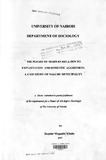| dc.description.abstract | In this report, the researcher presents the findings of a study investigating the factors behind mistreatment of maids by their employers The study was carried out from
November 1994 to February 1995 in Nakuru Municipality, Nakuru District
Realising that there is no one overall theory of exploitation and aggression, the
study was based on two theoretical perspectives; the theory of aggression and the Marxist
Social Class Theory. A number of distinct areas were covered in the literature review,
including the entire realm of domestic violence where, it was deemed, aggression and
general mistreatment of maids lie.
lt was found that literature on domestic violence is dominated by a few strands of
thought These include child abuse, spouse battering, incest, abuse of the elderly and
marital rape.
General literature on maids' predicaments was addressed and this includes
employers' suspicion on maids, maids' salaries, millds and discipline, their ignorance on their
own rights and privileges and emotional insecurity Literature on maids outside the Kenyan
context was also reviewed, as well as the provisions ofthe law on general mistreatment
The study assumed 'prima facie' that maids cannot be aggressors, hypothesi sing
that maids background together with the characteristics of the employer constitute the key
factors that may explain the maid's tribulations
The research design was an intra-municipality survey. An interview schedule was
developed as the principal research instrument and this was administered to a total of 104
maids in 10 residential estates, their respective 104 employers and 14 children in some of
these families Both qualitative and quantitative data were collected. and the Gamma
coefficient is the major tool used in analyzing this information
Data were presented in simple frequencies, then followed a comprehensive crosstabulation
analysis and interpretations. These cross-tabulations revealed the following
major findings
1. Higher achiever maids in terms of formal education have an easier life than those with
very low or no education at all.
2. Maids who have the same religion and ethnicity as the employer are more vulnerable to
acts of mistreatment thai! those who differ in these respects. Those who are related to the
employer by either blood, marriage or adoption are the most hit by the incidence of mistreatment.
3. There is a continuum with respect to intensity of mistreatment from single maids through
single mother maids to the married maids Married maids are mistreated the least
4r Marital status of the employer influences mistreatment of maids in the following order
Divorced employers are the most aggressive followed by the never-married, then the
married. Widowed employers are the least known in mistreating maids.
5. Low education of employers leads to low salaries for maids, although it does not
necessarily bring about other aspects of mistreatment.
The study concludes that different backgrounds of maids bring about different
levels of mistreatment, and that the socio-economic characteristics of the employer
constitute a major factor in mistreatment The study recommends a change of attitude by
employers towards maids. | en |

